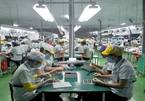
Businesses have donated money to buy Covid-19 vaccines, as well as technological innovations and useful applications to fight the epidemic.
In the field of technology, FPT Group has cooperated with the Ministry of Health to develop the virtual assistant nCov, which answers more than 1 million questions raised by Vietnamese people about the epidemic and supports students at 15,000 schools nationwide to study online for free during the quarantine time.
Viettel Group has developed a series of "speedy" solutions: Vietnam Health app within six days; “electronic medical declaration” system in just two days; F0 tracing system by phone numbers; and the Telehealth system connected to more than 1,000 medical facilities within 45 days.
Large corporations ceased most of their manufacturing activities to make ventilators when the country faced the risk of lacking ventilators for Covid-19 patients. In a short period of time, thousands of ventilators were manufactured and donated to the Ministry of Health. Corporations facing difficulties still donated tens of millions of US dollars to develop vaccines against Covid-19.
When farmers in many provinces could not sell their products due to the pandemic, VnPost, Viettel Post and other e-commerce platforms immediately helped farmers sell their products online. The Voso.vn e-commerce floor of Viettel Post, under the direction of the Ministry of Information and Communications and the Ministry of Industry and Trade, offered litchi, a specialty fruit of Bac Giang province – the country’s largest Covid-19 epicenter - on its floor since May 28, with the goal of selling 100 tons of litchi per day.
Many businesses have been willing to accept losses to fight the pandemic. Airports have stopped welcoming passengers from overseas. Airlines have carried aid and overseas Vietnamese people back home. Banks cut profits on preferential loans.
Corporate social responsibility

Corporate Social Responsibility (CSR) is becoming a strong wave. According to the World Bank's Private Economic Development Group, CSR is the commitment to contribute to sustainable economic development, through compliance with standards on environmental protection, gender equality, occupational safety, labor rights, fair pay, employee training and development, and community development in a way that is beneficial to both businesses and society. CSR has long been implemented by Vietnamese businesses for charity purposes.
Liz Maw, a member of the board of directors of the World Environment Center, said that sustainable development is not only important for the community, and for the planet, but also for the success of businesses.
In the context of globalization and international integration, if corporations do not comply with social responsibility, they will not be able to access the world market. Corporate social responsibility helps to regulate the behavior of business entities, improve the quality, brand value and reputation of corporations, and attract good labor resources and increase profit.
Moreover, corporate social responsibility contributes to enhancing the national image, through the role of the government in creating a complete legal environment, an equal playing field for businesses. It provides information and guidance on incentive mechanisms and policies for enterprises.
There are more than 1,000 codes of conduct showing corporate social responsibility in the world, such as SA 8000 - labor standard in manufacturing factories; WRAP - Worldwide Responsible Accredited Production - the world’s largest factory-based certification program for manufacturers of clothing, footwear and other sewn products; ISO 14001 - environmental management system in enterprises; ISO 26000 - CSR standard of the International Organization for Standardization, and others.
To implement corporate social responsibility, businesses must have criteria and rules, and define their core values. Japan is the most successful example in this regard, from which Vietnam should learn. Most Japanese enterprises have clear criteria when building and providing services and goods that are beneficial to consumers. They pursue three requirements: good for sellers, good for buyers and good for society.
Mr. Vu Tien Loc, Chairman of the Vietnam Chamber of Commerce and Industry (VCCI), emphasized that sustainable development and responsible business will be the new value system in business development of the new era. This is the passport for each business and the economy to go deeper and further into the global market.
More than a responsibility: a mission
In the process of economic development and national construction, Vietnam is facing many challenges such as environmental protection, human resource training, poverty alleviation and sustainable development, and raising national image in the international arena. The role and social responsibility of enterprises are increasingly important.
A number of surveys around the world show that consumers want companies not only to perform traditional roles such as making profits, paying taxes, and complying with the law, but also to contribute to broader social goals. Going beyond social responsibility is the mission for the development and strength of the country.
As Minister of Information and Communications Nguyen Manh Hung once emphasized: Vietnamese businesses must serve their country so that the country can develop. Thus businesses can have a larger market, a peaceful environment for doing business, and have greater profits. To further develop, Vietnamese businesses should incorporate the spirit of serving the country into their culture and turn it into their development philosophy.
Duy Khanh

Spirit of serving the country part of corporate culture of tech-firms
If businesses want to continue to develop, the spirit of serving the country must be incorporated into their culture, becoming a philosophy of development.

Businesses seek sources to buy vaccines for their workers
The electronics, textile and garment, footwear, wooden furniture and dairy sectors have proposed that the Government allow them to seek vaccine sources and pay for vaccinations at their enterprises so they can maintain production.